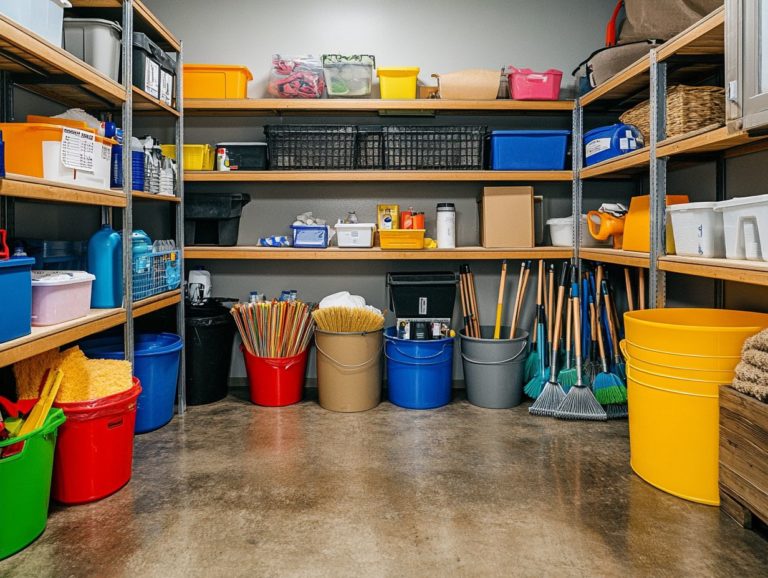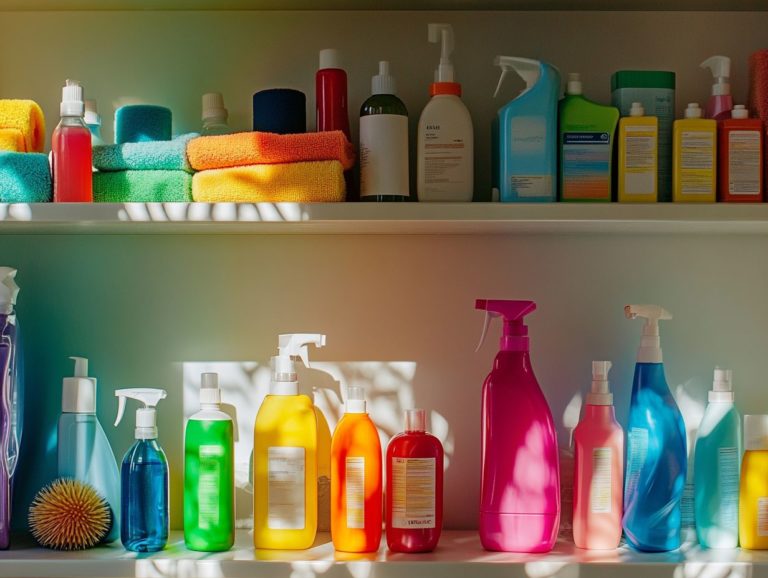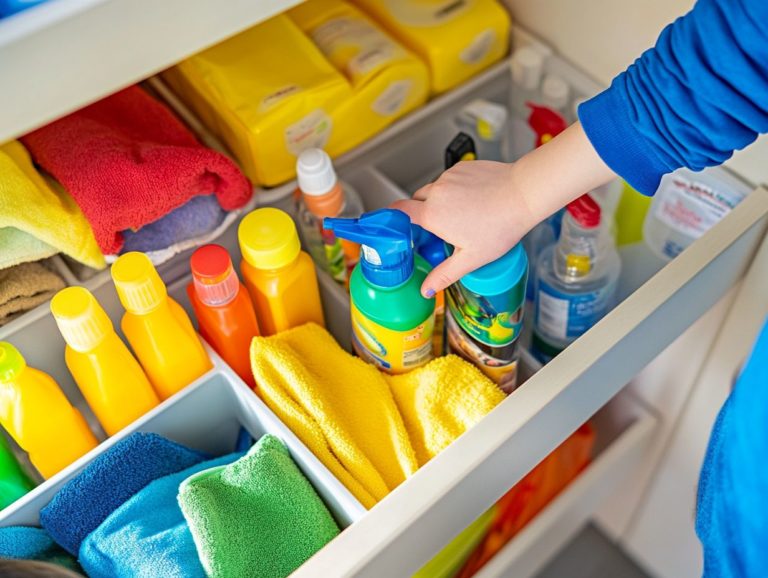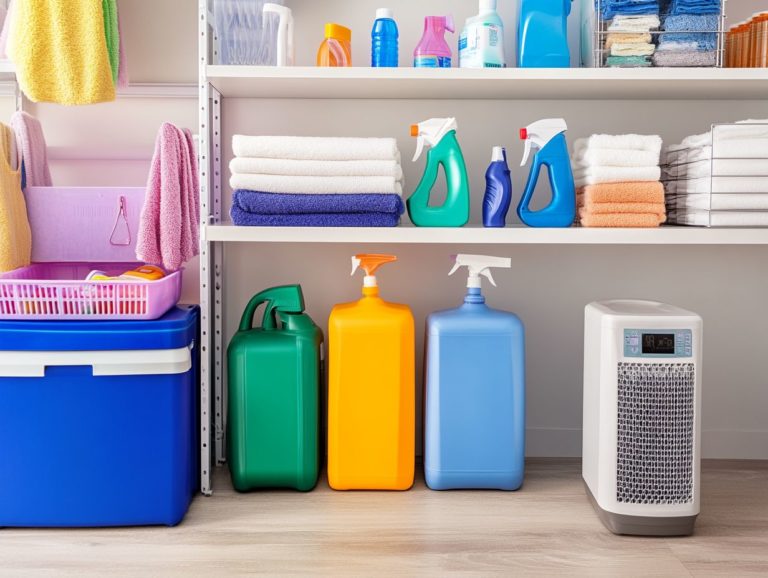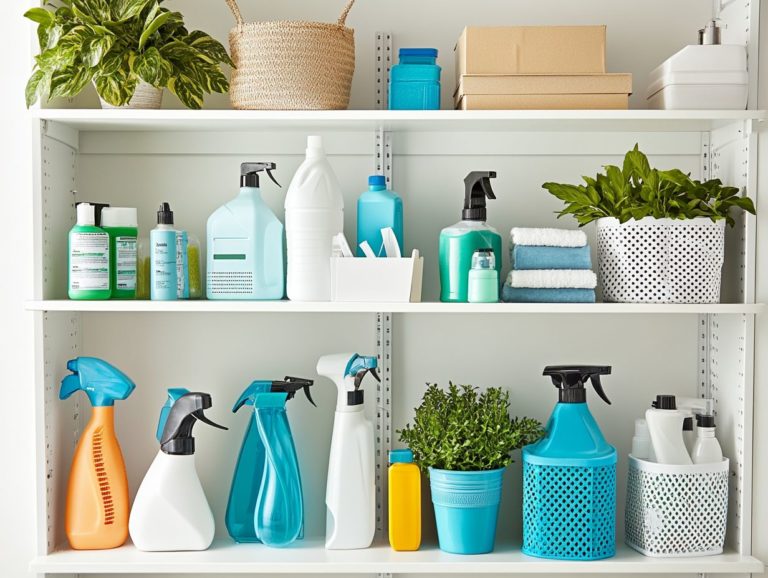A Guide to Storing Natural Cleaners Safely
Storing natural cleaners safely is crucial for a healthy home, especially with children and pets around. Safe storage prevents accidental swallowing and exposure to toxic chemicals.
This guide highlights the importance of safe storage. It also provides insights on the best places for your cleaners and the right containers to use.
You ll learn how to label and organize your products effectively. You ll also discover how to avoid common storage mistakes and responsibly dispose of any unused cleaners.
By the end, you ll be ready to secure your home with safe cleaning practices!
Contents
- Key Takeaways:
- Why Should You Store Natural Cleaners Safely?
- Where Should You Store Natural Cleaners?
- What Are the Best Storage Containers for Natural Cleaners?
- How to Label and Organize Natural Cleaners
- What Are Some Common Mistakes When Storing Natural Cleaners?
- How to Dispose of Natural Cleaners Safely?
- Frequently Asked Questions
Key Takeaways:
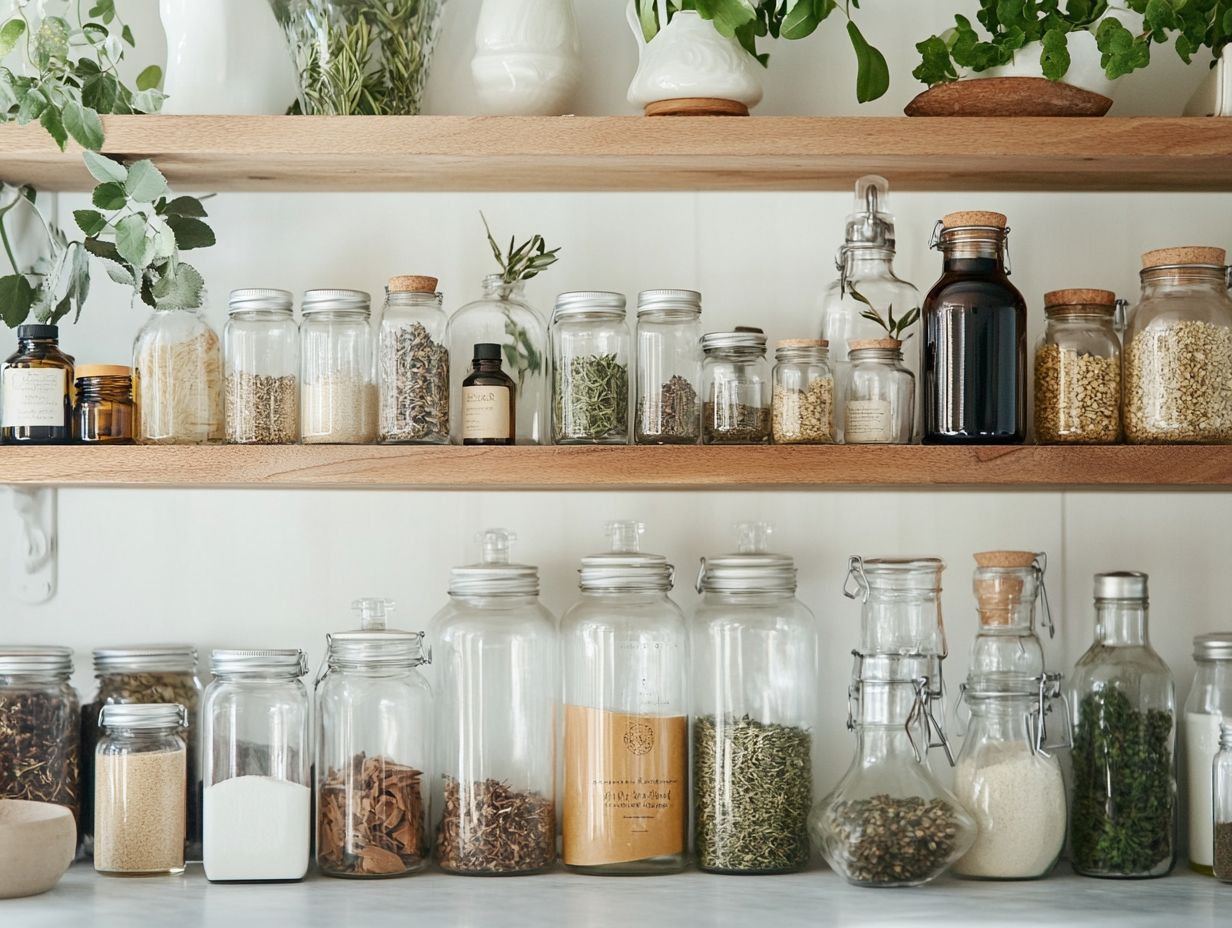
Why Should You Store Natural Cleaners Safely?
Storing natural cleaners safely protects your family and the environment. Even eco-friendly products like baking soda, white vinegar, and liquid soap can be dangerous if not stored correctly.
Following guidelines from the U.S. Environmental Protection Agency, a government agency that protects public health and the environment, helps you choose safer products.
Where Should You Store Natural Cleaners?
Finding the right spot for your natural cleaners is key to keeping them effective and safe, particularly if you have children and pets. Aim for a cool, dark area that is well-ventilated and away from sunlight and heat sources.
This approach extends the lifespan of your cleaning supplies and reduces the chance of harmful chemical reactions.
1. Away From Children and Pets
It s critical to keep natural cleaners out of reach of children and pets to avoid any accidental swallowing or exposure. Many natural cleaners are safer, but it s still essential to store them properly.
Designate storage areas like high shelves or locked cabinets to keep curious hands and paws away. You can enhance safety by using child-proof locks on cabinets.
Clearly label all cleaning products to help caregivers identify risks easily. Place natural cleaners in less accessible spots, like the top shelf of a pantry, to minimize the risk of exposure.
Regularly check your cleaning supplies to ensure they remain secure and suitable for household use.
2. Away From Heat and Sunlight
To maintain the integrity and effectiveness of your natural cleaners, it s essential to store them away from heat sources and direct sunlight. Exposure to high temperatures or UV rays can degrade your cleaning supplies, rendering them ineffective and potentially releasing harmful substances.
This is especially important for products that contain a mixture of liquid soap or vinegar, as they may react unfavorably when exposed to excessive heat. You should also be mindful of essential oils, which are often included in homemade cleaning solutions. These oils are sensitive to heat and light, and such exposure can lead to a loss of their aromatic and antibacterial properties.
For instance, citrus oils like lemon or orange can break down more quickly in warm conditions, diminishing their cleaning power. Choose cleaning supplies labeled as natural to ensure they are eco-friendly.
To ensure these valuable ingredients remain potent, it s advisable to store them in insulated cabinets or storage bins that protect them from temperature fluctuations. Keeping your cleaners in a cool, dark place extends their shelf life, allowing you to benefit from their natural effectiveness for a more extended period.
3. In a Well-Ventilated Area
Storing natural cleaners in a well-ventilated area is essential for preventing the buildup of potentially harmful fumes that certain cleaning agents can emit. Ensuring adequate airflow not only maintains the effectiveness of products containing cleaning agents that kill germs but also promotes a healthier indoor environment.
This practice becomes even more critical when you re managing a variety of cleaning supplies, especially those with strong fragrances or chemical components. Using products labeled with words on the label that indicate how dangerous the product is can help in identifying their level of toxicity and handling them appropriately.
Selecting the right storage locations, like laundry rooms or utility closets, can greatly enhance ventilation. These spaces typically offer better airflow, which reduces the risk of fume accumulation that might lead to respiratory issues or other health concerns.
It’s vital to regularly monitor these areas for any signs of chemical buildup, such as strong odors or leaks from containers. Taking this proactive approach not only extends the lifespan of your natural cleaners by preserving their integrity but also contributes to a safer living environment.
Thoughtful storage practices are key to maintaining both product efficacy and household safety. Choose the right storage location now to keep your home safe and your cleaners effective!
What Are the Best Storage Containers for Natural Cleaners?
Choosing the right storage containers for your natural cleaners is crucial to maintaining their effectiveness and ensuring safety. Proper storage is part of overall chemical safety practices. Your best options include:
- Glass jars: Great for bulk items and won’t leach chemicals.
- Plastic spray bottles: Easy to use for daily cleaning solutions.
- Metal tins: Keep solid cleaners secure and safe from moisture.
All designed to protect the contents while preventing contamination and degradation. Glass jars are perfect for storing bulk supplies such as baking soda and white vinegar, allowing you to keep these essentials fresh.
Plastic spray bottles are incredibly practical for your ready-to-use solutions, ensuring convenience at your fingertips. Meanwhile, metal tins are an excellent choice for securely housing solid cleaning agents or your homemade concoctions.
By taking these simple steps, you can ensure your natural cleaners remain effective and safe to use.
1. Glass Jars
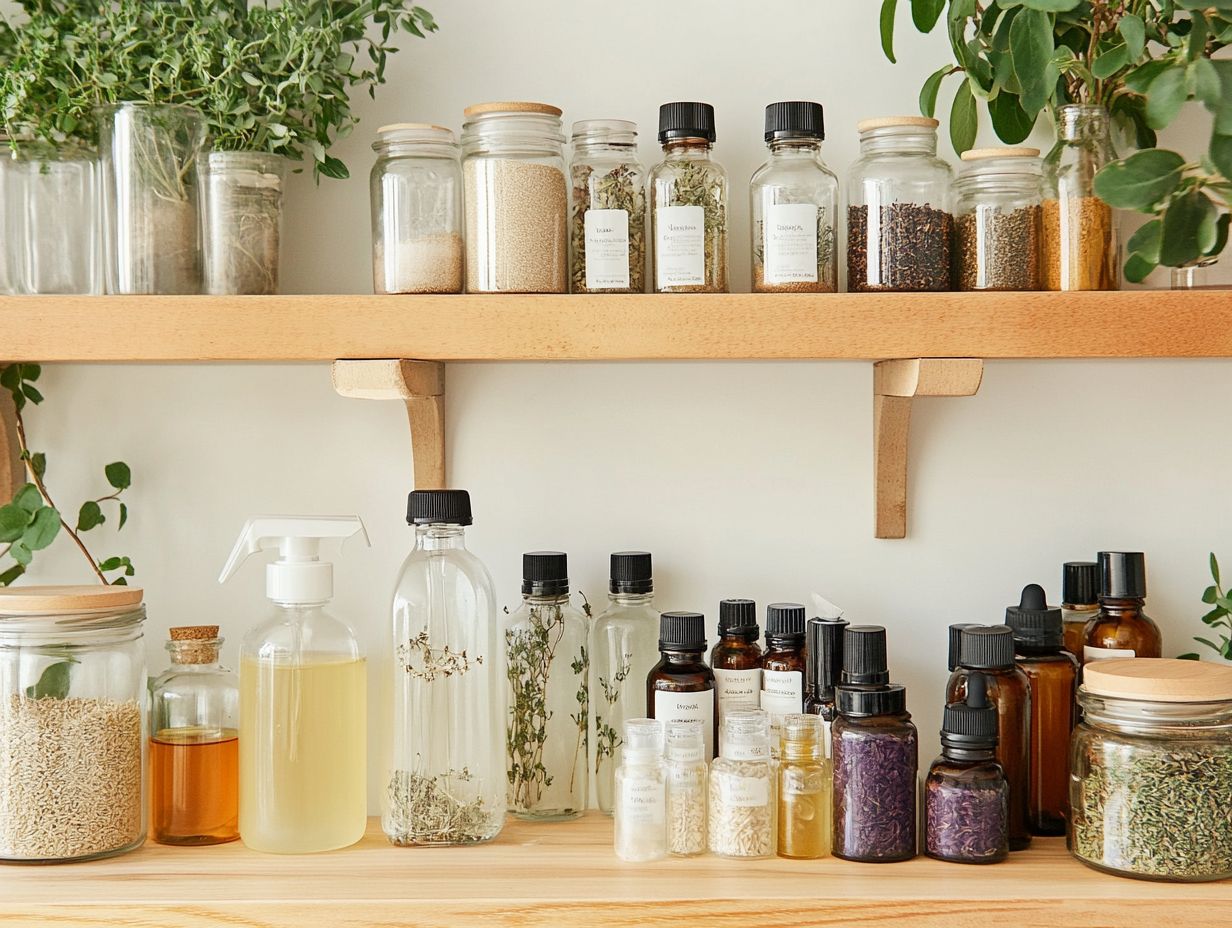
Glass jars are the perfect storage solution for your natural cleaners. They keep your contents safe from contamination and won’t react with most cleaning agents.
They re especially great for storing bulk ingredients like baking soda and white vinegar, making it easy to access and measure when preparing your homemade cleaning recipes.
Using glass jars has notable environmental benefits. Unlike plastic containers, glass can be recycled completely and won’t leach harmful chemicals into your contents, ensuring safety for both your family and the planet.
To maximize the longevity and effectiveness of your stored cleaners, it’s wise to label each jar with its contents and the date of storage. By keeping these jars in a cool, dark place, you protect the natural ingredients from light and heat, which can reduce their potency over time. For enhanced safety, consider using labels that indicate the level of hazard and refer to how to safely store cleaning chemicals.
This straightforward storage practice not only preserves the quality of your cleaning supplies but also fosters an organized and eco-friendly cleaning routine.
2. Plastic Spray Bottles
Plastic spray bottles are a fantastic choice for storing and using liquid natural cleaners. They make your cleaning tasks quicker and easier, allowing you to spray solutions like vinegar or liquid soap without any fuss!
Their lightweight design enhances your cleaning experience, enabling you to maneuver them easily without feeling fatigued. You can achieve a more thorough clean without the strain of managing heavier containers.
When selecting spray bottles, it’s essential to choose high-quality options that resist chemicals to ensure your safety. These materials can withstand various solutions without degrading or leaching harmful substances.
Proper labeling is crucial, allowing you to quickly identify the contents for effective use while minimizing the risk of accidental misuse. This attention to detail helps create a safer cleaning environment for you and anyone else involved.
3. Metal Tins
Metal tins present an exceptional storage solution for your natural cleaners, especially for solid cleaning agents or homemade pastes that need protection from moisture and light. With their airtight seals, these tins keep your cleaning supplies effective and free from contamination.
Moreover, metal tins excel in durability, offering a level of protection that plastic containers simply can’t provide. This robust construction ensures that even accidental drops won’t compromise the safety of your household cleaners.
When utilizing tins, it s crucial to label them clearly to prevent confusion and maintain an organized cleaning supply area. Apply labels that not only indicate what s inside but also the date of preparation for your homemade cleaning supplies.
To preserve the integrity of your cleaners, store these tins in a cool, dry environment. Shielding them from heat and humidity is essential, as these factors can significantly degrade their effectiveness over time.
How to Label and Organize Natural Cleaners
Labeling and organizing your natural cleaners is vital. It ensures quick access and safe usage, helping you avoid confusion and accidents.
A well-organized storage space lets you easily find products like baking soda and white vinegar when you need them. Clear labels with ingredients and usage directions enhance safety and give you peace of mind.
What are your favorite tips for organizing natural cleaners? Share your ideas and help others create their eco-friendly cleaning routines!
1. Label with Ingredients and Directions
Labeling natural cleaners with clear ingredients and directions is essential for your safe and effective use. This practice significantly reduces the risk of misuse or accidental mixing of incompatible products.
Imagine a well-labeled bottle of vinegar-based cleaner. It alerts you to its contents and guides you in following the appropriate usage guidelines, ensuring both safety and effectiveness. Be sure to include signal words for added safety.
Detailed labeling is also important for including crucial information such as expiration dates and dilution ratios details that are often overlooked yet play a vital role in achieving optimal performance. When you can easily read and understand these specifics, you empower yourself to use the product correctly, enhancing both your safety and the longevity of the cleaner.
High visibility and legibility in labels help prevent accidents such as the dangerous mix of bleach and ammonia. They also build greater trust in the products you choose to use. For instance, when a concentrated cleaner has a clearly marked dilution ratio, you can use it properly, achieving the desired results without compromising your safety. Recognizing natural claims on labels can also assure you of their safety and efficacy.
2. Keep Similar Cleaners Together
Organizing similar cleaners together is a brilliant strategy for keeping your cleaning storage area neat and allowing you to easily locate and utilize products as needed. By grouping items like all-purpose cleaners, vinegar solutions, and baking soda mixes, you streamline the process of finding the right supplies for specific tasks, significantly enhancing your efficiency during cleaning routines.
Consider using sponges and other accessories to complement your organizing efforts. When you categorize items based on their function such as surfaces, degreasers, and disinfectants you gain quick access to what you need without having to sift through chaos.
This organizational method not only brings a sense of calm to your cleaning efforts but also greatly improves safety. By keeping hazardous chemicals separate from general-use products, you minimize the risk of accidents. Use safety tips for storing cleaning solutions from organizations like Toxic-Free Future for best practices.
To effectively group similar items, consider using bins or labels for clear identification. Ensure that like products are stored at eye level for easy reach. This approach not only saves you valuable time but also transforms your cleaning experience into a more enjoyable endeavor overall. Experts like Mary Cornetta of Sort and Sweet Inc recommend this method.
What Are Some Common Mistakes When Storing Natural Cleaners?
By overlooking proper storage protocols, you might be making common mistakes that can endanger your safety and cleaning effectiveness. Errors like mixing different cleaners, neglecting to securely close containers, and disregarding shelf life recommendations can lead to wasted products, hazardous chemical reactions, and less effective cleaning solutions.
Following guidelines from the U.S. Environmental Protection Agency can help avoid such issues. Being mindful of these pitfalls is crucial for anyone striving to maintain a safe and efficient household cleaning routine.
Check your cleaning supplies now!
1. Mixing Different Cleaners
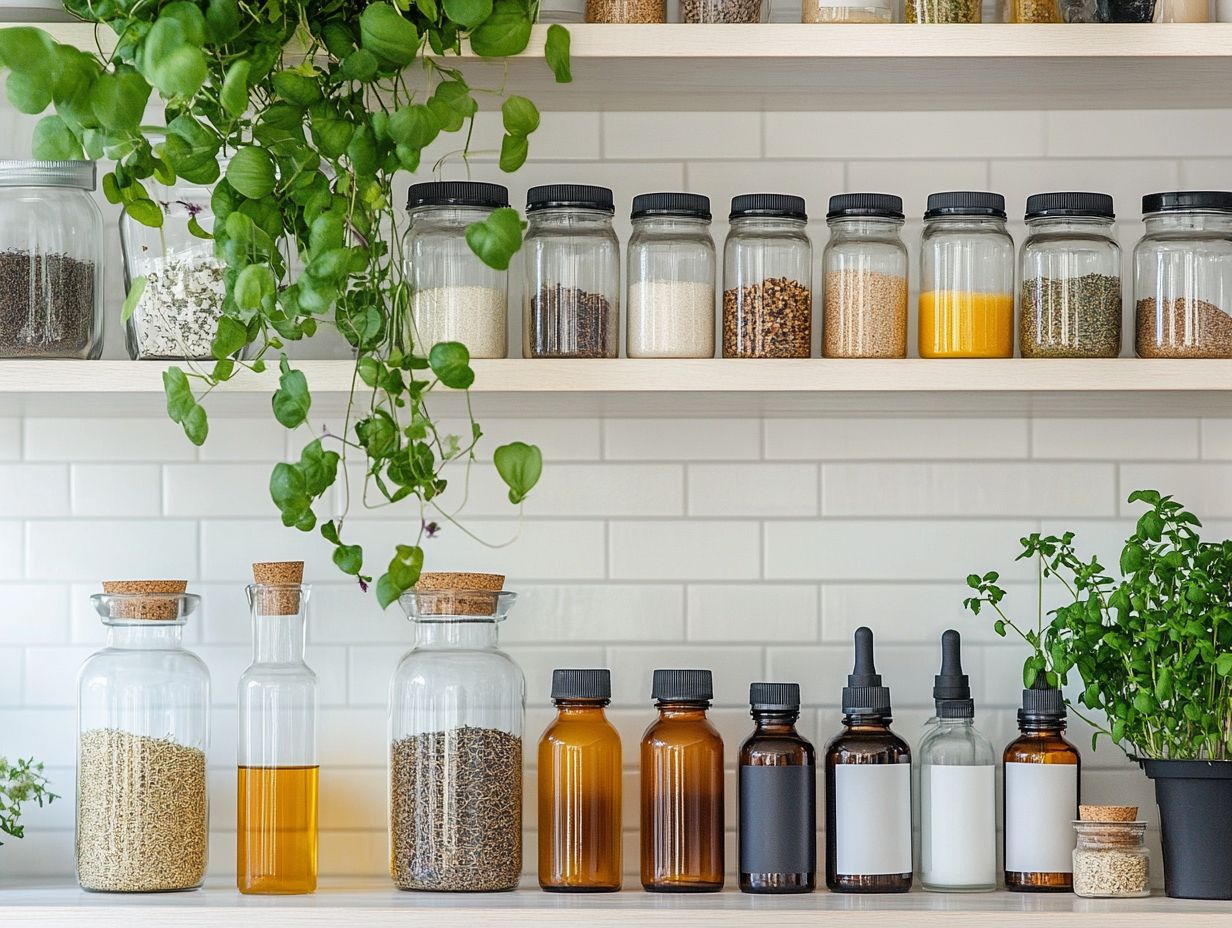
One of the most significant blunders you can make in storing natural cleaners is mixing different products. This can not only create dangerous chemical reactions but also render your cleaners ineffective. Take vinegar, for example a beloved natural cleaner. When you combine it with bleach, you unleash toxic chlorine gas, which poses serious health risks.
It’s essential to understand how different cleaners work together to steer clear of hazardous situations and maximize your cleaning effectiveness. Utilizing cleaning techniques recommended by experts like Marcus Reeves from New York University can be very beneficial.
You might think that mixing baking soda with vinegar is harmless, but this combination can lead to a vigorous reaction that causes overflowing or splattering resulting in a mess instead of a pristine surface. Additionally, combining ammonia with certain bathroom cleaners can generate toxic fumes that are hazardous even in well-ventilated areas.
Always read labels to stay safe and effective!
That’s why it’s important to take the time to read labels and grasp the ingredients you’re working with. This ensures not only the effectiveness of your cleaning routine but also your safety and that of those around you.
2. Not Properly Closing Containers
Failing to properly close containers for natural cleaners is a common oversight that can lead to product contamination and less effective cleaners. When containers are left open, they become vulnerable to air, moisture, and light, which can speed up degradation and potentially result in spills or accidents especially in homes with children or pets. Make sure to tightly seal all containers after each use for safety.
To avoid these risks, develop a habit of checking containers visually before storing them away. A simple check to confirm that all caps and lids are securely fastened can save you from unwanted mishaps.
Using containers designed for safe storage can provide peace of mind, as they often feature superior sealing mechanisms and child-proof designs. By emphasizing the importance of this practice, you prolong the life of your cleaning products and enhance the overall safety of your environment, reassuring caregivers that their spaces remain clean and secure. Consider using FlexMax bags and products by Facility+ to further enhance storage safety.
3. Not Using Cleaners Within Their Shelf Life
Using natural cleaners beyond their shelf life is a mistake that could diminish their effectiveness or even introduce safety risks. The ingredients in natural cleaners, like baking soda and vinegar, can lose their potency over time, leading to less-than-stellar cleaning results and potential reactions when combined with other products. It s essential to keep track of shelf life and adhere to usage recommendations to maintain a safe and efficient cleaning routine. Ensuring adherence to NFPA 30 standards, which ensure safe storage of flammable liquids, can also be beneficial.
For example, regularly checking the condition of these products and noting their expiration dates can ensure that they remain reliable when you need them the most. A smart approach is to label each container with the purchase date or expiration date, making it easy to monitor their longevity. The Safer Choice label can also guide you in selecting products with safer chemical compositions.
Conducting routine inventory checks can help you identify items that may be nearing their end, allowing you to dispose of or replace them in a timely manner. By implementing these straightforward practices, you can enhance your cleaning efficacy while promoting a safer environment, all while maximizing the benefits of your natural cleaning solutions.
How to Dispose of Natural Cleaners Safely?
Disposing of natural cleaners safely is crucial for preventing environmental contamination and ensuring the safety of your household. Unlike traditional cleaning chemicals, many eco-friendly products can be disposed of without causing harm. Consider using fragrance-free products to further minimize your ecological footprint.
However, it’s essential that you follow local guidelines to guarantee proper disposal methods. This means steering clear of pouring chemicals down the drain and exploring options like recycling or donating unused supplies. By doing so, you not only promote sustainability but also contribute to a healthier planet.
1. Follow Local Guidelines
Following local guidelines for disposing of natural cleaners is essential to ensure safe and environmentally responsible practices. Each area may have specific regulations that dictate how to eliminate various cleaning products, particularly those containing chemical components.
By familiarizing yourself with these local disposal rules, you can minimize your ecological footprint and contribute meaningfully to the safe management of household waste. To navigate these regulations effectively, consider consulting resources such as city websites, where waste disposal guidelines are often outlined in detail.
Local waste management authorities can also be invaluable, providing essential information and even hosting disposal events or offering designated drop-off locations for hazardous materials (substances that can harm health or the environment). Always prioritize products from brands recognized by EDS for their safety and sustainability efforts.
By adhering to these rules, you not only safeguard your community by preventing potential contamination of water and soil but also embrace a collective responsibility toward protecting the environment. This commitment fosters a more sustainable and healthy lifestyle for everyone involved. Utilizing household cleaners that are eco-friendly and ensuring safe storage of these items are also crucial steps.
2. Do Not Pour Down Drains
Never pour natural cleaners down the drain! This simple action can protect our environment and your plumbing. Even products marketed as eco-friendly can disrupt local ecosystems if not disposed of correctly, resulting in unintended consequences for wildlife and water quality.
Instead, explore safe disposal methods in your area that align with local regulations, ensuring that your waste management practices are both safe and responsible. For example, using cleaning techniques such as baking soda, white vinegar, or liquid soap can help reduce harmful impacts.
Many individuals might not realize that even substances that appear benign can cause significant harm when mixed with municipal wastewater. For instance, natural cleaners often contain oils or acids that can gradually corrode pipes, leading to costly repairs or frustrating blockages down the line.
To mitigate these risks, seek out designated disposal sites for household chemicals, many of which organize safe collection events. Refer to guidelines from the U.S. Environmental Protection Agency and look for the Safer Choice label on products to ensure safer and more environmentally friendly disposal.
Community programs may accept used cleaners for proper treatment, helping you protect both your plumbing and the environment from harmful contaminants.
Join the movement for a cleaner planet. Start disposing of your natural cleaners responsibly today!
3. Give Your Unused Natural Cleaners a New Life!
Donate your unused natural cleaners and help your community while supporting the environment. It’s a fantastic way to promote sustainability and reduce waste. Many local groups are happy to accept sealed or gently used cleaning supplies, including antimicrobial products. This responsible approach keeps harmful products out of landfills and extends the lifespan of cleaning products.
Local shelters, food banks, and community outreach programs welcome these items. They help maintain a clean and safe environment for those they serve. Schools and childcare facilities can also benefit from your cleaning products. Just ensure that all items donated are sealed and in good condition to maximize their usability and comply with safety standards.
Reach out to organizations such as Toxic-Free Future or professional organizers like Mary Cornetta of Sort and Sweet Inc for guidance on donation protocols. Paying attention to these details cultivates a ripple effect of goodwill and fosters a culture of care and health within your community.
Frequently Asked Questions
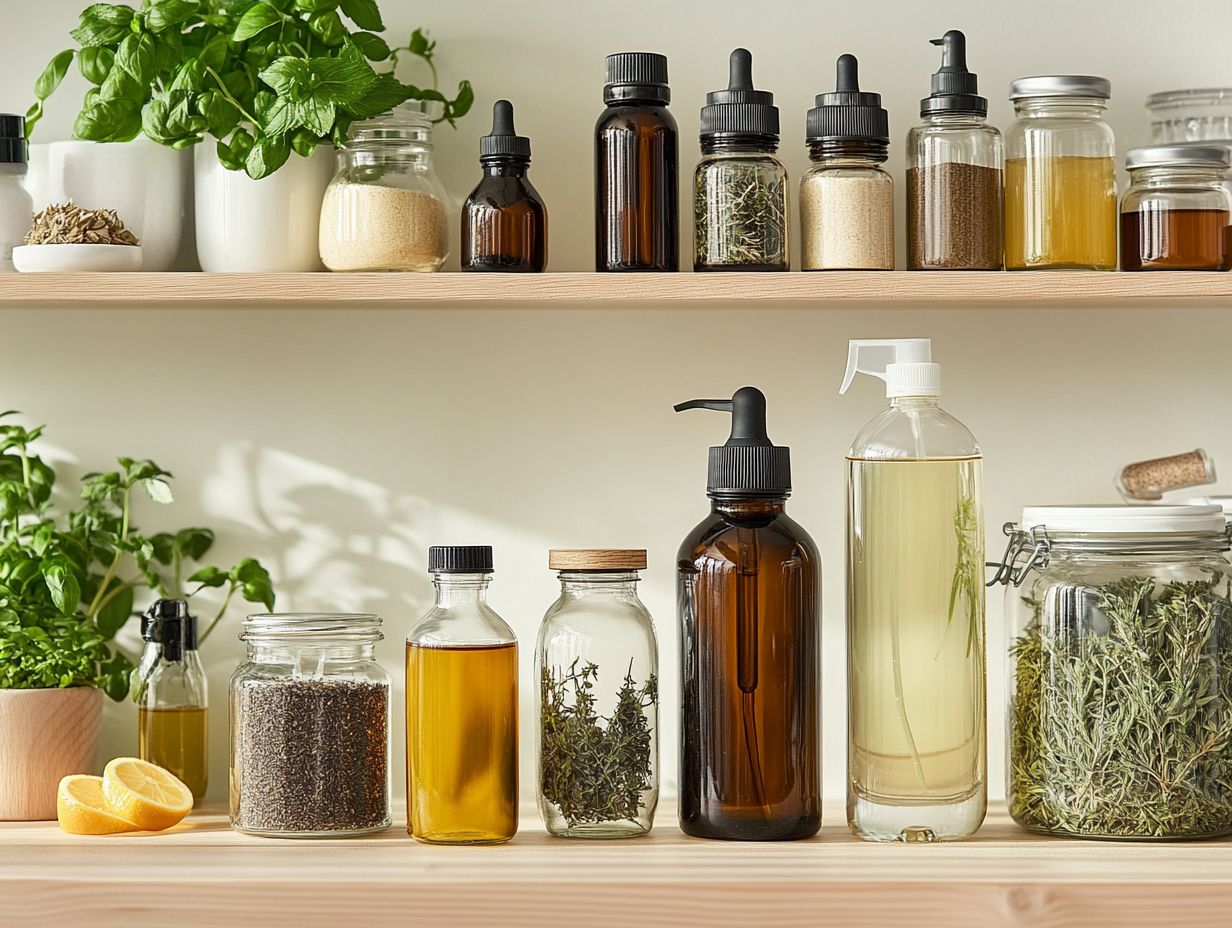
What are natural cleaners?
Natural cleaners are cleaning products made from plant-based ingredients and other naturally occurring substances, as opposed to synthetic chemicals. They often feature natural claims and are preferred by those seeking fragrance-free products for sensitive environments.
Why is it important to store natural cleaners safely?
Storing natural cleaners safely is important because they can be harmful if not used correctly. Many natural cleaners contain potent essential oils and other ingredients that can be toxic if ingested or used improperly. Adhering to chemical safety guidelines and using appropriate cleaning storage solutions is crucial.
How should I store natural cleaners?
Store natural cleaners in a cool, dry place away from direct sunlight. Keep them out of reach of children and pets to prevent accidental ingestion. Using signal words on labels can help identify the level of hazard and precautions required.
What containers should I use to store natural cleaners?
It’s best to store natural cleaners in their original containers or in airtight containers made of glass or BPA-free plastic. Avoid using metal containers, as some ingredients may react with the metal. For instance, chlorine bleach should never be mixed or stored in metal containers.
Can I mix different natural cleaners together for storage?
No, it’s not recommended to mix different natural cleaners together for storage. Some ingredients may react with each other, causing a chemical reaction and potentially creating a hazardous substance. Following guidelines from the NFPA 30 standard can help ensure safe storage.
How long can I store natural cleaners?
The shelf life of natural cleaners varies depending on the ingredients and storage conditions. Check the expiration date on the product and discard any cleaners that have expired. If there is no expiration date, a good rule of thumb is to use them within one year. Store unused products properly using FlexMax bags or other secure storage solutions to ensure longevity.

